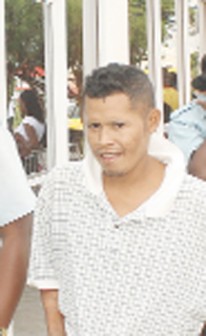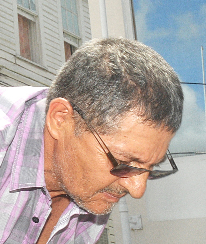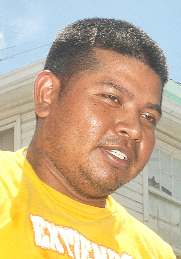Acting Chief Magistrate, Priya Sewnarine-Beharry yesterday acceded to a request from the defence and transferred the Cuyuni cocaine bust case to the Bartica Magistrate’s Court.
Yesterday’s date was set to facilitate defence counsel Vic Puran’s application to have the matter removed from the court of the acting Chief Magistrate. After reading from the Law Reform Miscellaneous Amendments No. 14 of 1988, the magistrate informed the lawyer that the matter would be transferred since the law makes provision for her to transfer the matter.

Terry James, Louis Alberto Garcia, Clint Collier, Deonarine Singh and Randolph Singh are charged with trafficking in narcotics. It is alleged that on June 9 at Batavia Island, Cuyuni River, Essequibo, they trafficked in 149 kilogrammes 638 grammes of cocaine. They have all denied the charge and remain imprisoned. Reports are that the cocaine is worth in excess of $800 million.
On Monday, Puran had related to the court that James was uncomfortable with Magistrate Sewnarine-Beharry hearing his case since she facilitated him answering the narcotic charge while he was “patently ill,” on June 13 when originally a June 20 adjournment had been granted. Puran contended that given these circumstances, the court showed no concern for his client’s wellbeing.
Yesterday’s hearing was also set to report on James’ condition. Police prosecutor, Stephen Telford informed the court that the prisoner, who suffers from diabetes, was still a patient of the Georgetown Public Hospital where he was taking medications as his glucose level was still high. Telford, on behalf of the prison medex reported that the defendant’s glucose level was “very uncontrollable.” The prosecutor said too that contrary to the previously held contention of Puran, the accused, while in prison, was seen and medically examined by the medex there.
Puran, however, argued that his client should have been seen by the doctor as directed by the court. He contended that a medex is not a doctor and does not have like competencies in the field as the doctor would have.

Like he did when the matter was called on Monday, Puran reiterated that his client was patently ill and should not have been allowed to answer the narcotic trafficking charge when he was taken to court on June 15. The other accused made their appearance before the magistrate on June 13. James was however absent at this initial hearing as he was hospitalized. The court had subsequently granted June 20 for reports on his condition and to have read the charge to him if, by then, he was discharged.
On June 13 however, James who appeared to have been ill was taken to court with the assistance of police officers as he appeared to have been unable to walk unaided. He repeatedly groaned and wheezed heavily appearing to have been in pain.
Counsel who was absent from this hearing said that though the police were aware that James was legally represented, they made no effort to notify him [Puran] that there was a change in the date that his client would have been taken before the court. More importantly, the lawyer argued that his client was “patently ill, unable to walk and speak coherently,” at the time he was taken to court to answer the charge narcotics trafficking charge.
The lawyer said that because of this; [his client’s condition at the time the charge was read to him], he wrote to the Guyana Medical Council suggesting that the doctor who discharged his client from hospital on June 15 be removed “for his incompetence.”
Not duty bound
Puran again emphasized that because of his client’s illness, the court should not have facilitated him to answer the charge; more so sine he [Puran] was not informed by the police.
The magistrate in response however firmly asserted that the courts cannot refuse to see a prisoner when brought by the police. She told Puran that the court could not be blamed for reading the charge to the accused who was taken before her.

Further, she said that while out of courtesy the police could have informed him that his client would have been taken to court before the date originally set by the court, “the court has no bounded duty to inform counsel that he needed to attend.” Puran, she said; should have been present for his client’s matter.
Addressing the lawyer’s concern that his client was not seen by a doctor, Magistrate Sewnarine-Beharry said that she did order that James be granted medical attention and the fact that he was referred to the hospital for further treatment beyond what could have been provided by the prison shows that medical attention was granted.
At the end of the dialogue, the acting chief magistrate told Puran that there was no merit in his laying blame at the feet of the court for reading the charge to James and his claim that his client was not seen by a doctor.
The other accused made their appearance before the magistrate on June 13. James was however absent at this initial hearing as he was hospitalized. The court had subsequently granted June 20 for reports on his condition and to have read the charge to him if by then he was discharged.
Yesterday, some two hours after Telford reported to the court that James was still hospitalized, the defendant made an appearance at the Georgetown Magistrates’ Court. The acting Chief Magistrate informed him that his matter has been transferred to the Bartica Magistrates’ Court for June 30.
Shortly after noon yesterday, James, walking slowly but unaided, arrived at court. The rank who brought him in, informed the court that shortly before their arrival at court; he [James] had been discharged from hospital. When asked by the magistrate how he was feeling, James who appeared to have been stronger and breathing with normalcy replied; “ah feeling a bit better.”
Puran was absent at this second hearing yesterday.





